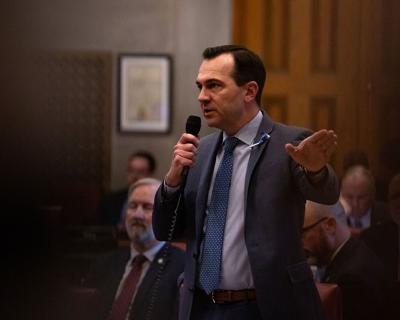A bill headed for both the House and Senate floors names some instances in which an abortion could be legal in Tennessee to preserve the life of the mother. The legislation’s opponents say the bill is designed to absolve the state’s attorney general from a lawsuit.
In action, the bill would not add any exceptions to allow for abortions, sponsor Rep. Bryan Terry (R-Murfreesboro) clarified during the final House Health Committee meeting Tuesday. Instead, Terry said, it would specify some cases in which an abortion could fall under the state ban’s sole exception of “serious risk of substantial and irreversible impairment of major bodily function.” The key word is “could.”
Sen. Richard Briggs describes ‘biggest disappointment of the session’
“The current law does state that you have to provide the best opportunity for the baby to survive,” Terry said Tuesday. “So this doesn't say that if these conditions are present, that you can definitely have an abortion, but we recognize that these conditions may lead to a substantial and irreversible impairment.”
These conditions listed are: previable/premature rupturing of membranes, inevitable abortion, severe preeclampsia, mirror syndrome associated with fetal hydrops and infection that could result in uterine rupture or loss of fertility.
During a Senate Judiciary Committee meeting last week, co-sponsor Sen. Richard Briggs (R-Knoxville) added: “I want to make it absolutely clear that this bill is simply about clarifying and elaborating on the existing ‘life and health of the mother’ exception in current law. Under this bill ‘reasonable medical judgment’ still applies.”

Rep. John Ray Clemmons
Rep. John Ray Clemmons (D-Nashville) pointed out during the Tuesday meeting that he would have preferred a separate bill sponsored by Rep. Esther Helton-Haynes (R-East Ridge) and Briggs. That legislation, which has stalled, would have allowed abortions in cases of lethal fetal anomalies, fetuses with complications so severe that they could not sustain life outside of the womb.
“I wish we had taken that piece of legislation up and moved it along, and I hope we will do so next year to actually provide us some real solutions to this ongoing problem,” Clemmons said.
Chancery court ruling adds several carve-outs for health of mother
During the previous legislative session, Briggs, who is a physician, said he would introduce legislation to allow for abortions in the case of fatal fetal anomalies. After tabling the bill following pressure from lobbyists, Briggs told the Scene it was his biggest disappointment of the session.
Clarification of what it means to protect the life of the mother is something physicians have brought up repeatedly since Roe v. Wade was overturned, including through a lawsuit brought by the Center for Reproductive Rights and some Tennessee physicians.
In October, a three-judge panel ruled in Davidson County Chancery Court that doctors could perform an abortion from a list very similar to the one from the aforementioned legislation: premature rupture of the amniotic sac that surrounds the fetus; fatal fetal diagnoses that result in severe preeclampsia or mirror syndrome associated with fetal hydrops; and fatal fetal diagnoses leading to an infection that will result in uterine rupture or potential loss of fertility, in addition to inevitable abortions.
Clemmons on Tuesday raised concerns that the law was intended to get the Tennessee Attorney General out of the aforementioned lawsuit.
Medical professionals say bill is step in right direction, though allowances are too limited
In 2023, exceptions to the state’s abortion ban in cases of molar pregnancies, ectopic pregnancies and a dead fetus were added. A physician-supported bill to allow for “good faith” rather than “reasonable” medical judgment was tabled.
Last week, bills to allow for an abortion in cases of rape an incest stalled, with a bill from Sen. Charlane Oliver (D-Nashville) and Gabby Salinas (D-Memphis) taken off notice in the House Population Health Subcommittee.
Earlier in the session, efforts in the House by Rep. Gloria Johnson (D-Knoxville) to reverse Tennessee’s abortion ban failed.
In addition, HB 14 from Rep. Harold Love (D-Nashville) failed — that legislation was created to clarify that "criminal abortion" under Tennessee’s abortion ban does not include the use of contraceptives or the disposal of embryos from IVF.








